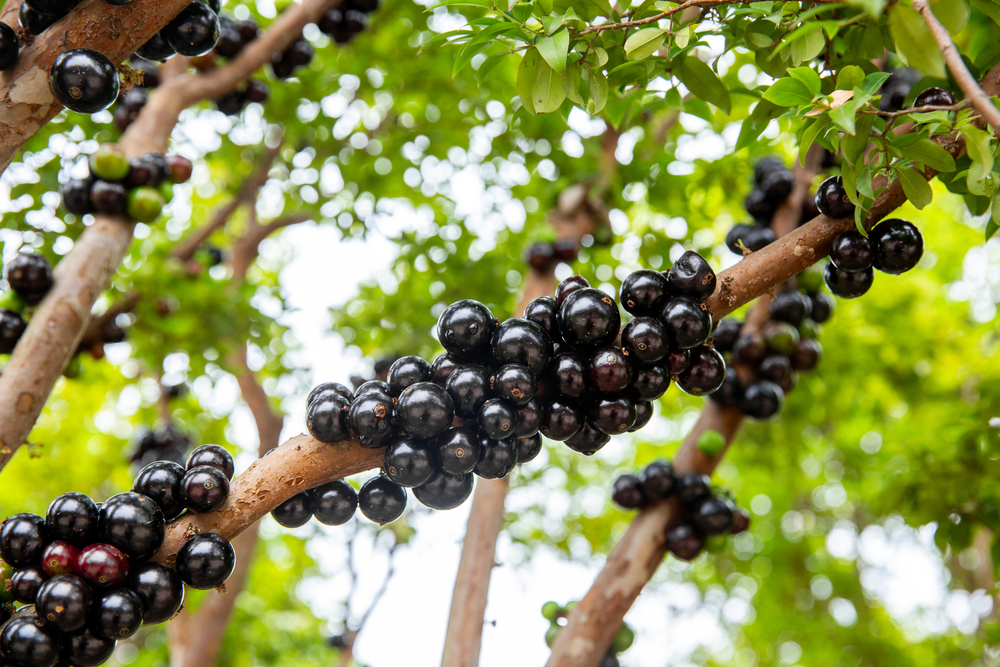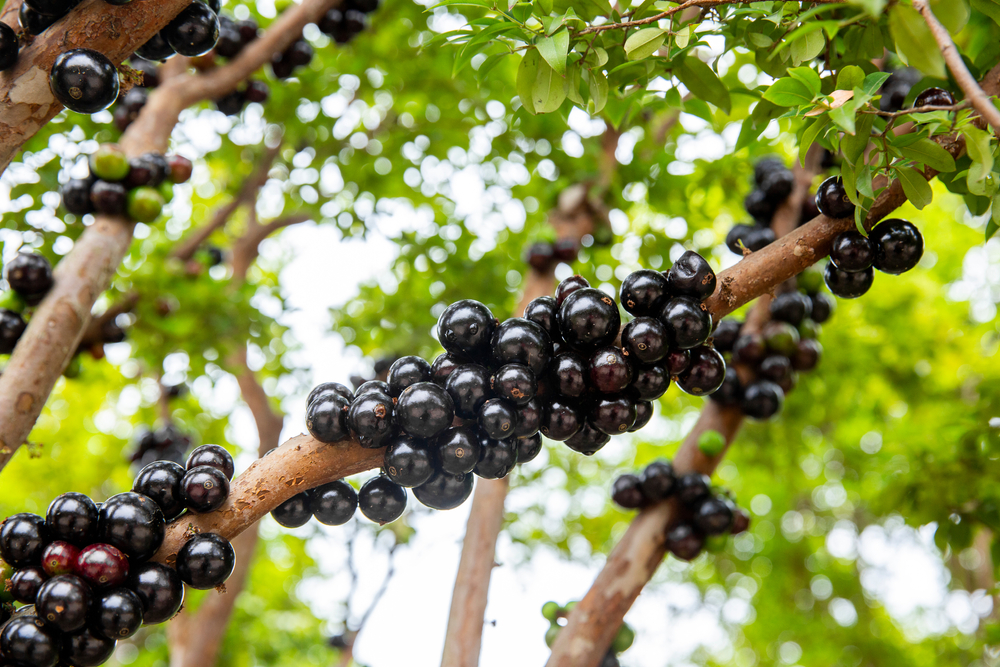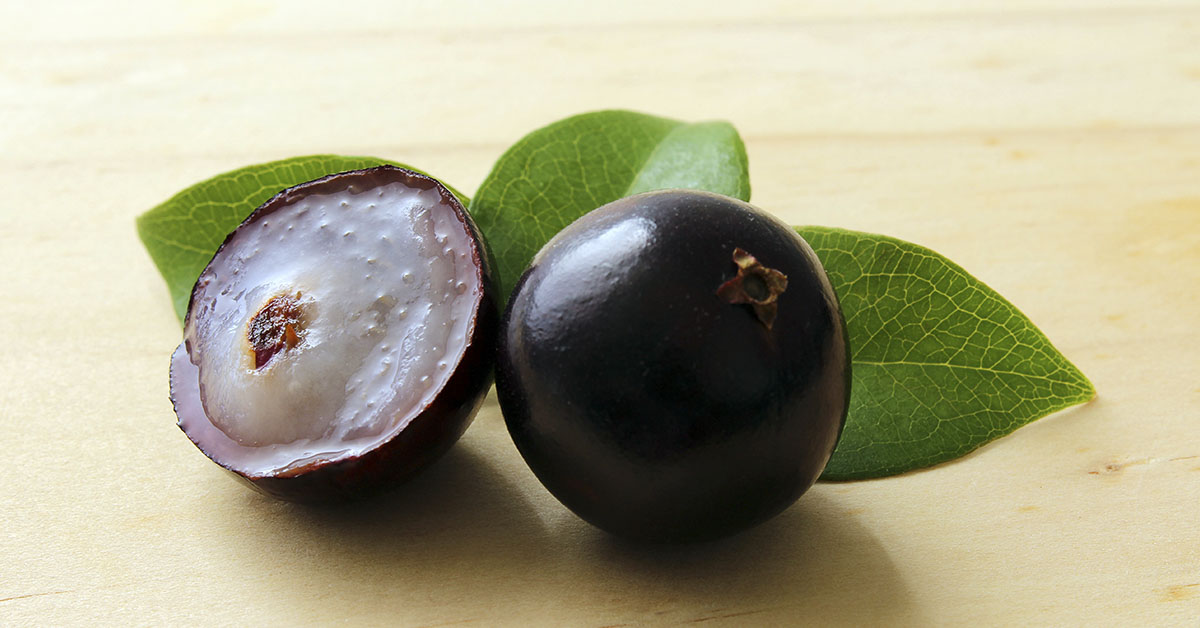Jaboticaba fruit, also known as Brazilian grapes, is a native fruit of Brazil. The fruit is round, dark purple, and has a tough outer layer. It has a unique flavor that is sweet and slightly acidic. The fruit is mostly consumed fresh but can also be used to make jams, jellies, wines, and liquors. This special fruit is making headlines around the web for all of its potential benefits – but do the claims actually hold any weight? Let’s find out.
What is Jaboticaba Fruit?

As already mentioned, this fruit, colloquially known as Brazilian Grapes, is native to Brazil and looks, well, like grapes. They are round, dark purple in color, and have reasonably thick outer skin. Though they don’t taste like the grapes we are used to in North America, they do have a sweet and slightly acidic flavor that does draw some parallels. (1)
In Brazil, jabuticaba fruit is traditionally used for medicinal purposes. It is believed to help with asthma, diarrhea, tonsillitis, and fungal infections. The fruit is also rich in antioxidants, protein, calcium, iron, and vitamin C. It has only been in the last decade or so that researchers have been studying this fruit, to determine what the possible benefits might be.
Read More: This Fruit May Help Prevent Fragility in Old Age, Study Says
Possible Benefits of Jabuticaba Fruit

As stated, the benefits of this fruit are called “possible” because there is still not very much research on it. This means that it is difficult to say definitively that if you eat the jaboticaba, you will experience these benefits. Keep this in mind while you read this section.
- Contains Antioxidants: Jaboticaba contains high amounts of antioxidants such as anthocyanins and tannins. These antioxidants have been proven to have anti-inflammatory, anticancer, and anti-aging properties. This means that it could help to prevent certain types of cancer and slow down the aging process. The antioxidants in this fruit may also protect your cells from damage caused by free radicals, which may be related to the development of certain diseases. (2)
- Promotes gut health: Jaboticaba fruit contains prebiotic fibers that promote gut health by stimulating the growth of good bacteria in the gut. This can help to boost the immune system and reduce inflammation in the digestive tract. It may also help to prevent certain types of cancer by inhibiting the growth of bad bacteria. (3)
- May help lower blood pressure: According to a study published in the Journal of Nutrition, jaboticaba extract has been shown to lower blood pressure in hypertensive rats. However, human studies are needed to confirm this benefit. (4, 5)
- Rich in essential nutrients: Jaboticaba fruit is rich in essential nutrients such as vitamin C, calcium, and iron. These nutrients are essential for the proper functioning of the body. It is also a good source of phosphorus and fiber, which are important for overall health. (6)
Read More: 8 Gardening Hacks That Will Help Flowers, Veggies, And Fruit Flourish
Where to Find and How to Eat

Jabuticaba fruit is primarily found in Brazil, but it can also be found in some parts of South America. The fruit is usually eaten fresh, but it can also be made into jams, jellies, wines, and liquors. The fruit is usually consumed by peeling the outer layer and eating the pulp and seed inside. It can also be used to make various desserts such as cakes, ice creams, and sorbets. It does not have a very long shelf life, therefore it is difficult to find outside of the regions in which it is grown.
The Bottom Line

Jabuticaba fruit is a nutrient-rich fruit that has several potential health benefits. While more research is necessary to confirm the full range of benefits, incorporating this delicious fruit into a healthy, balanced diet may be a great way to support overall health and wellness.
Read More: The Best Ways to Remove Pesticides from Your Fruit and Vegetables
Sources
- “Jabuticaba.” Specialty Produce
- “Phytochemistry and health benefits of jaboticaba, an emerging fruit crop from Brazil.” Science Direct. Shi-Biao Wu, et al. November 2013.
- “Gut microbiota modulation by jabuticaba peel and its effect on glucose metabolism via inflammatory signaling.” NCBI. Paulo Sérgio Loubet Filho, et al. February 2022.
- “Vasorelaxant and Hypotensive Effects of Jaboticaba Fruit (Myrciaria cauliflora) Extract in Rats.” NCBI. Daniela Medeiros Lobo de Andrade, et al. 2015.
- “JABOTICABA FRUIT.” Fruits Info

